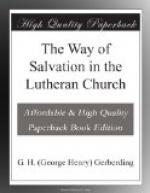Where, on the other hand, the seeds of baptismal Grace have been neglected, where the germs of the new life lie dormant or asleep, or where there never has been any implanting of Grace through Word or Sacrament—in short, where there are no pulsations, no manifestations of the new life, there the pastor has a different duty. He must endeavor to so bring the acquired truth to bear on the conscience and heart, as to awaken and bring about a sense of sin, a genuine sorrow therefor, a hatred thereof, a longing for deliverance, a turning to Christ and a laying hold on Him as the only help and hope.
Thus the one great aim and object of the conscientious pastor, with each impenitent catechumen, is to awaken and bring about genuine, heartfelt penitence and a true, trusting, clinging faith. In one word, he must labor for that catechumen’s conversion. Only those of whom there is evidence that they are in a converged state should be admitted to confirmation.
By this we do not mean, as some do, that each one must be able to tell when, and where, and how he was converted. We mean simply this: That each one must have in his heart true penitence, i.e., sorrow for and hatred of sin, and true faith, i.e., a confiding, trustful embracing of Christ as the only Saviour.
Whether these elements of the new life have been constantly and uninterruptedly developed from Baptism, or whether they have been awakened gradually by the Word, is not material. The only important question is: Are the elements of the new life now there—even though as yet feeble and very imperfect—or, is the person now turned away from sin to a Saviour? If so, we consider that person in a converted state.
And this much, we believe, should be demanded of each catechumen before he is admitted to the rite of confirmation. And it is largely because this has not been demanded as the only true and satisfactory result of catechisation, that this important branch of the Church’s activity has so largely fallen into disrepute. It is doubtless because of carelessness on this point that so many fall back after confirmation to the world, the flesh and the devil. They did not hold fast to their crown because they had no crown.
Where the Catechism is properly learned, understood and applied, the intellect is used as the gateway to the heart. Where the result of an enlightened mind is a changed heart, there are intelligent believers. They know what it means to be a Christian. They have an earnest desire for closer fellowship with Him who has loved them and washed them from their sins in His own blood. There is good hope that such will be faithful unto death.
CHAPTER XII.
CONFIRMATION.




